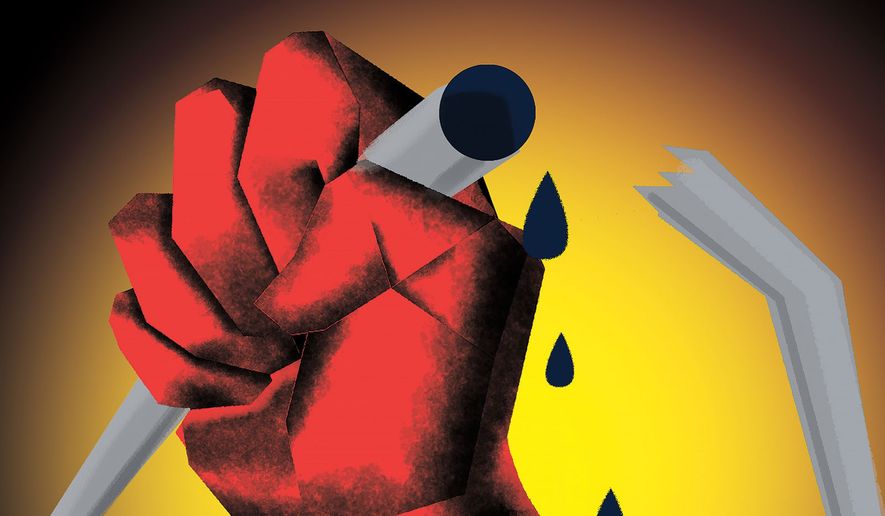OPINION:
Since the Sept. 26 ruptures of the Nord Stream pipelines, Russian President Vladimir Putin has accused the United States of sabotage.
“The sanctions were not enough for the Anglo-Saxons: they moved on to sabotage. It is hard to believe, but it is a fact that they organized the blasts on the Nord Stream international gas pipelines,” he said.
Some Western journalists have bolstered this absurd narrative, naively suggesting that Russia has nothing to gain by disrupting its own pipelines. Shortly after the ruptures, Fox News host Tucker Carlson suggested the U.S. sabotaged the pipeline while “escalating” tension over Russia’s invasion of Ukraine, a narrative that was quickly promoted by Russian state television. Journalist Glenn Greenwald, a frequent guest of Mr. Carlson, similarly asked, “Why would Russia explode their own pipeline that gives them enormous amounts of leverage?” Fox News’ Dan Bongino argued, “They could just shut the pipeline down. … It doesn’t make sense.”
The problem with these statements, and many others that have continued since Russia invaded Ukraine, is that they make the mistake of framing Moscow through a Western lens and ultimately benefit Russia while hurting the United States. They demonstrate total ignorance of the Putin regime and reveal a lack of awareness that Mr. Putin’s regime came to power in 1999 using an explosive act of terror against its own people, and that it regularly engages in state-sponsored terrorism to confuse its opponents and maintain power.
The Nord Stream ruptures were a warning to the West that the Kremlin has the capability to destroy any pipeline in the world. European countries suspect this, which is why Denmark, Italy, Norway and Poland recently escalated security and surveillance on their own undersea pipelines, and why Denmark, Germany and Sweden have blocked Russia from the investigation site. A similar demonstration was used in 2014 when Russian separatists shot down the Malaysian airliner MH17 with a Buk-M1 missile, amplifying concerns that the conflict was spinning out of control and ultimately leading the West to pressure Ukraine to enter one-sided negotiations.
In this case, the timing of the pipeline ruptures are revealing. The purported explosions occurred one day after Poland and Norway opened their own energy stream — the Baltic pipeline — which runs through Denmark and reduces energy reliance on Russia. The Nord Stream ruptures overshadowed the inauguration of the new pipeline and sent a clear warning: If Russia can disrupt its own pipelines, it can destroy others, too.
Russia’s willingness to engage in “false flag” attacks against itself as a way to manipulate public opinion is not new. In his book “The Less You Know, the Better You Sleep,” Russia scholar David Satter described how a 1999 bombing of four Moscow apartment buildings — which killed 307 innocent civilians and injured a thousand others — led Mr. Putin to become president. A fifth bomb in Ryazan would have killed hundreds more, but it was disarmed, and those apprehended were members of Russia’s own federal security service, the FSB, run by Mr. Putin.
The bombings were blamed on Chechen rebels and used as a justification for the Second Chechen War. Mr. Putin, who was then prime minister, was put in charge of the war and in the wake of early successes experienced a surge in popularity. On the strength of his identity as a defender of innocent Russians who had been attacked by terrorists, he was elected president in March 2000.
The Nord Stream ruptures are hardly comparable to the lengths the Kremlin went — and the risks it took — in 1999 when it murdered hundreds of its own civilians in what went down in history as Moscow’s most significant terrorism attack.
One of the two Nord Stream pipelines ruptured was not even active at the time, and some experts believe the disruptions could have easily been caused by maintenance robots. With the profit spike Moscow has made from increased energy prices, it is unlikely the disruption in the pipeline will be too costly, and what it’s getting in return is well worth the price. In August, Reuters reported that Russia has seen a 38% rise in energy exports this year, with Moscow projecting a $100 billion spike for 2022.
Russia knows the value of turning the American public against its own government. When Western voices parrot the Kremlin’s position, it discourages support for Ukraine and damages the United States. Journalists who think they can view Russia through the same “commonsense” lens they view the U.S. would be well reminded that the operational methodologies of the East and West are very different.
As Mr. Satter says, “Understanding Russia is actually very easy, but one must teach oneself to do something that is very hard — to believe the unbelievable. To grasp the reality of Russia, it is necessary to accept that Russian leaders are really capable of blowing up hundreds of their own people to preserve their hold on power. Once one accepts that the impossible is really possible, the degradation of the Yeltsin years and Vladimir Putin’s rise to power make perfect sense.”
• Jeffrey Scott Shapiro is an attorney and journalist who served as a senior adviser in the Trump administration at the U.S. Office of Cuba Broadcasting from 2017 to 2021. He has reported on Russian affairs and now serves on the editorial board of The Washington Times.




Please read our comment policy before commenting.